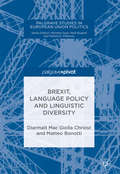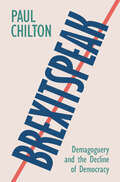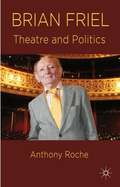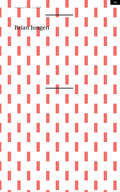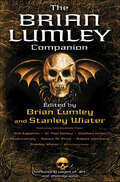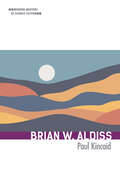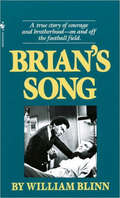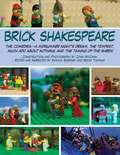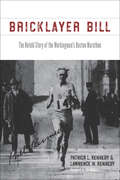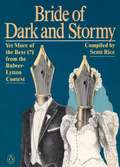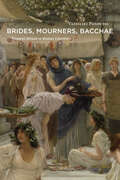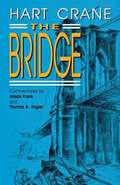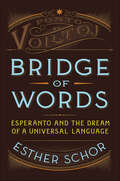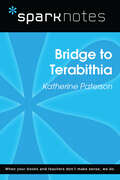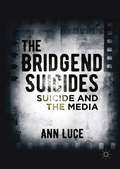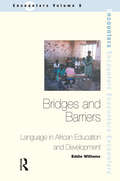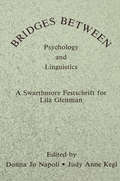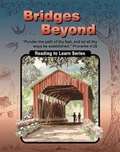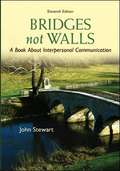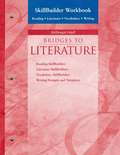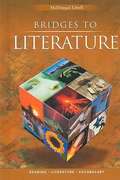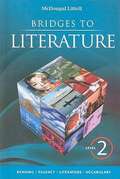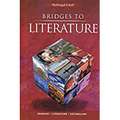- Table View
- List View
Brexit, Language Policy and Linguistic Diversity (Palgrave Studies in European Union Politics)
by Matteo Bonotti Diarmait Mac Giolla ChríostThis book argues that Brexit will wholly re-shape the legal framework and public policy norms relating to linguistic diversity that have dominated public life in the UK and the EU since the Treaty on European Union in 1993. First, Brexit de-anchors the linguistic actors engaged with sub-state nationalisms in the UK (in Northern Ireland, Wales and Scotland) from the ethno-linguistic imaginary of the so-called ‘Europe of the regions’. This strengthens the case both for the de jure recognition of English as the official language of the UK and for embedding autochthonous minority language rights and freedoms in a transformed UK constitution. Second, Brexit strengthens the normative case for English as the lingua franca of the EU, by reducing the injustices associated with the rise of English as the EU and global lingua franca. The book will appeal to students and scholars across the fields of political science, political theory, law, language policy and planning, and sociolinguistics.
Brexitspeak: Demagoguery and the Decline of Democracy
by Paul ChiltonWere we talked into Brexit? And who is 'we'? It's impossible to do politics without words and a context to use them in. And it's impossible to make sense of the phenomenon of Brexit without understanding how language was used – and misused – in the historical context that produced the 2016 referendum result. This interdisciplinary book shows how the particular idea of 'the British people' was maintained through text and talk at different levels of society over the years following World War II, and mobilised by Brexit propagandists in a socially, economically and culturally divided polity. The author argues that we need the well-defined tools of linguistics and language philosophy, tied in with a political science framework, to understand a serious, modern concept of demagoguery. Written in an accessible manner, this book is essential reading for anyone who wants to probe the social, political and ideational contexts that generated Brexit.
Brian Friel
by Anthony RocheFriel is recognised as Ireland's leading playwright and due to the ability of plays like Translations and Dancing at Lughnasa to translate into other cultures he has made a major impact on world theatre. This study draws on the Friel Archive to deepen our understanding of how his plays were developed.
Brian Jungen
by Brian Jungen Homi Bhabha Solange De Boer Clint Burnham Zoë GrayPublication initially published in print on the occasion of the exhibition Brian Jungen at Witte de With, 2 Dec 2006 to 11 Feb 2007.
The Brian Lumley Companion
by Stanley WiaterEdited by Brian Lumley and multiple Bram Stoker Award winner Stanley Wiater, The Brian Lumley Companion is an indispensable guide to the life and works of Brian Lumley. The Companion is illustrated with photographs from the author's private collection and full-color reproductions of Hugo Award–winning artist Bob Eggleton's eye-catching cover art for Lumley's works. Contributors to The Brian Lumley Companion include some of today's most noted experts on horror fiction, including W. Paul Ganley, founder of Weirdbook Press and two-time winner of the World Fantasy Award; Stephen Jones, coeditor of Horror: 100 Best Books and winner of multiple World Fantasy, British Fantasy, and Bram Stoker Awards; Robert M. Price, author of H. P. Lovecraft and the Cthulhu Mythos and one of the most respected analysts of Lovecraftian fiction; Robert G. Weinberg, an acknowledged specialist in weird fiction, and Stanley Wiater, host of the TV series "Dark Dreamers." In The Brian Lumley Companion, Lumley aficionados will find an overview of Lumley's career, from his first short fiction up to the present day; essays comparing Lumley and H. P. Lovecraft, a lengthy interview with the author that delves into the heart of Lumley's relationship with the writers and editors who inspired him and the fans who support him, and analyses of Lumley's short fiction and novels. An interview with Bob Eggleton gives insight into the development of his striking covers for the Necroscope series and other Lumley works. This companion also includes complete listings of the first publications of each of Lumley's novels, short fiction, and poetry. Major attractions are the detailed concordances that focus on individual novels and series, including the three Psychomech titles, the Dreamlands and Primal Lands series, and each volume in the Necroscope series. As a special treat, The Brian Lumley Companion includes three short short stories by Brian Lumley, works that have never before appeared in book form.
Brian W. Aldiss (Modern Masters of Science Fiction)
by Paul KincaidBrian W. Aldiss wrote classic science fiction novels like Report on Probability A and Hothouse. Billion Year Spree, his groundbreaking study of the field, defined the very meaning of SF and delineated its history. Yet Aldiss’s discomfort with being a guiding spirit of the British New Wave and his pursuit of mainstream success characterized a lifelong ambivalence toward the genre. Paul Kincaid explores the many contradictions that underlay the distinctive qualities of Aldiss’s writing. Wartime experiences in Asia and the alienation that arose upon his return to the cold austerity of postwar Britain inspired themes and imagery that Aldiss drew upon throughout his career. He wrote of prolific nature overwhelming humanity, believed war was madness even though it provided him with the happiest period of his life, and found parallels in the static lives of Indian peasants and hidebound English society. As Kincaid shows, contradictions created tensions that fueled the metaphorical underpinnings of Aldiss's work and shaped not only his long career but the evolution of postwar British science fiction.
Brian's Song
by William BlinnTwo men. One named Gale Sayers, the other Brian Piccolo. They came from different parts of the country. They competed fiercely for the same job. One liked to talk; the other was shy. One was white; the other black. This is the story of how they came to know each other, fight each other, and help each other
Brick Shakespeare: The Comedies - A Midsummer Night's Dream, The Tempest, Much Ado About Nothing, and The Taming of the Shrew
by John McCann Monica Sweeney Becky ThomasExplore four of Shakespeare’s comedies like never before-with LEGO bricks! This book presents Shakespeare’s most delightful comedies, A Midsummer Night’s Dream, Much Ado About Nothing, The Taming of the Shrew, and The Tempest, in one thousand amazing color photographs. This unique adaptation of the world’s most famous plays stays true to Shakespeare’s original text, while giving audiences an exciting new perspective as the stories are retold with the universally beloved construction toy.Get caught up in hilarious misadventures as brick Puck leads the lovers astray through the brick forests of Athens. Watch Cupid kill with traps in the plot to marry Beatrice and Benedict. Marvel at the changing disguises of the men vying for brick Bianca’s affections, and feel the churn of the ocean as Prospero sinks his brother’s ship into the brick sea. These iconic stories jump off the page with fun, creative sets built brick by brick, scene by scene!This incredible method of storytelling gives new life to Shakespeare’s masterpieces. With an abridged form that maintains original Shakespearean language and modern visuals, this ode to the Bard is sure to please all audiences, from the most versed Shakespeare enthusiasts to young students and newcomers alike!
Bricklayer Bill: The Untold Story of the Workingman's Boston Marathon
by Patrick L. Kennedy Lawrence W. KennedyTwo weeks after the United States officially entered World War I, Irish American "Bricklayer Bill" Kennedy won the Boston Marathon wearing his stars-and-stripes bandana, rallying the crowd of patriotic spectators. Kennedy became an American hero and, with outrageous stories of his riding the rails and sleeping on pool tables, a racing legend whose name has since appeared in almost every book written on the Boston Marathon. When journalist Patrick Kennedy and historian Lawrence Kennedy unearthed their uncle's unpublished memoir, they discovered a colorful character who lived a tumultuous life, beyond his multiple marathons. The bricklayer survived typhoid fever, a five-story fall, auto and train accidents, World War action, Depression-era bankruptcy, decades of back-breaking work, and his own tendency to tipple. In many ways, Bill typified the colorful, newly emerging culture and working-class ethic of competitive long-distance running before it became a professionalized sport. Bricklayer Bill takes us back to another time, when bricklayers, plumbers, and printers could take the stage as star athletes.
Bride of Dark And Stormy: Yet More of the Best (?) from the Bulwer-lytton Contest
by Scott RiceIt's not easy to write bad fiction. On purpose. Scott Rice, organizer of the Bulwer-Lytton contest, asks people to do just that. Here are the best opening sentences of the worst hypothetical novels never written. <P><P> Just try to understand the 1987 winner: <P><P>"The notes Matted skyward as the sun rose over the Canada geese, feathered rumps mooning the day, webbed appendages frantically pedaling unseen bicycles in their search for sustenance, driven by cruel Nature's maxim, 'ya wanna eat, ya gotta work,' and at last I knew Pittsburgh." <P><P> But Bride of Dark and Stormy is not just a compilation. Now Scott Rice has added his own advice on how to write "successful" fiction in the Bulwer-Lytton mode, making this a perverse how-to book, full of rotten advice and worse examples.
Brides, Mourners, Bacchae: Women's Rituals in Roman Literature
by Vassiliki PanoussiHow does the treatment of women's rituals in Latin poetry and prose reveal Roman ideas of female agency?Powerful female characters pervade both Greek and Latin literature, even if their presence is largely dictated by the narratives of men. Feminist approaches to the study of women in Greek literature have helped illustrate the importance of their religious and ritual roles in public life—Latin literature, however, has not been subject to similar scrutiny. In Brides, Mourners, Bacchae, Vassiliki Panoussi takes up the challenge, exploring women's place in weddings, funerals, Bacchic rites, and women-only rituals. Panoussi probes the multifaceted ways women were able to exercise influence, even power, in ancient Rome from the days of the late Republic to Flavian times. Systematically investigating both poetry and prose, Panoussi covers a wide variety of genres, from lyric poetry (Catullus), epic (Ovid, Lucan, Valerius, Statius), elegy (Propertius, Ovid), and tragedy (Seneca) to historiography (Livy) and the novel (Petronius).The first large-scale analysis of this body of evidence from a feminist perspective, the book makes a compelling case that female ritual was an important lens through which Roman authors explored the problems of women's agency, subjectivity, civic identity, and self-expression. By focusing on the fruitful intersection of gender and religion, the book elucidates not only the importance of female religious experience in Rome but also the complexity of ideological processes affecting Roman ideas about gender, sexuality, family, and society. Brides, Mourners, Bacchae will be of value to scholars of classics and ancient religions, as well as anyone interested in the study of gender in antiquity or the connection between religion and ideology.
The Bridge
by Hart CraneBegun in 1923 and published 1930, The Bridge is Crane's major work. "Very roughly," he wrote a friend, "it concerns a mystical synthesis of 'America' ... The initial impulses of 'our people' will have to be gathered up toward the climax of the bridge, symbol of our constructive future, our unique identity."
Bridge of Words: Esperanto and the Dream of a Universal Language
by Esther SchorA rich and passionate biography of a language and the dream of world harmony it sought to realizeIn 1887, Ludwig Lazarus Zamenhof, a Polish Jew, had the idea of putting an end to tribalism by creating a universal language, one that would be equally accessible to everyone in the world. The result was Esperanto, a utopian scheme full of the brilliance, craziness, and grandiosity that characterize all such messianic visions.In this first full history of a constructed language, poet and scholar Esther Schor traces the life of Esperanto. She follows the path from its invention by Zamenhof, through its turn-of-the-century golden age as the great hope of embattled cosmopolites, to its suppression by nationalist regimes and its resurgence as a bridge across the Cold War. She plunges into the mechanics of creating a language from scratch, one based on rational systems that would be easy to learn, politically neutral, and allow all to speak to all. Rooted in the dark soil of Europe, Esperanto failed to stem the continent's bloodletting, of course, but as Schor shows, the ideal continues draw a following of modern universalists dedicated to its visionary goal.Rich and subtle, Bridge of Words is at once a biography of an idea, an original history of Europe, and a spirited exploration of the only language charged with saving the world from itself.
Bridge to Terabithia (SparkNotes Literature Guide Series)
by SparkNotesBridge to Terabithia (SparkNotes Literature Guide) by Katherine Paterson Making the reading experience fun! Created by Harvard students for students everywhere, SparkNotes is a new breed of study guide: smarter, better, faster.Geared to what today's students need to know, SparkNotes provides:chapter-by-chapter analysis explanations of key themes, motifs, and symbols a review quiz and essay topicsLively and accessible, these guides are perfect for late-night studying and writing papers.
The Bridgend Suicides
by Ann LuceThis in depth analysis looks at how suicide was represented in the British press when 20 young people between the ages of 15 and 29 took their own lives in the South Wales Borough of Bridgend in 2008. The chapters highlight specific categories of description that journalists use to explain suicide to their readers. The study also examines the discourses that emerged around suicide that continue to perpetuate stigma and shame when suicide occurs today. Using her own experience of having lost a loved one to suicide, coupled with original research, the author gives a very frank explanation of why suicide is not accepted in society today.
Bridges and Barriers: Language in African Education and Development
by Eddie WilliamsRecent decades have seen sub-Saharan Africa decline in both economic and human terms. The rich North has responded with a barrage of well-publicized initiatives, from pop concerts to international commitments on debt relief, aid, trade and good governance. Among the complex of factors necessary to sustain economic and human development, education receives little media coverage, although it is crucial. However, education must be effective. This book argues that in 'Anglophone' Africa, education is not effective because of the use of English, rather than children's first languages, both as the medium of instruction, and also as the language in which children are first taught to read. Research is presented from Malawi and Zambia, countries with contrasting language policies, using evidence from tests in English and African languages, small-group discussions and classroom observation. The findings show that English-medium policies in Africa do not give students any advantage in English over first-language policies, while the use of English discriminates against girls and rural children. The book concludes that much education in Africa is a barrier rather than a bridge to learning because of the prevailing language ideology, which has resulted in massive over-estimation of the value of English. While appropriate language policies alone will not solve education and development difficulties in Africa, they do have a positive contribution to make. The evidence presented here suggests they are failing to make that contribution.
Bridges Between Psychology and Linguistics: A Swarthmore Festschrift for Lila Gleitman
by Donna Jo Napoli Judy Anne KeglWritten as a tribute to Lila Gleitman, an influential pioneer in first language acquisition and reading studies, this significant book clearly establishes the relationships between psychology and linguistics. It begins with a thorough examination of issues in developmental psychology, continues with questions on perception and cognition, studies the realm of psycholinguistics, and concludes with an exploration of theoretical linguistics.
Bridges Not Walls: A Book About Interpersonal Communication
by John StewartSince the first edition in 1973, Bridges Not Walls has examined the power and promise of interpersonal communication in intimate relationships, families, communities, and cultures. The text presents a broad range of scholarly and popular articles drawn from several disciplines, including communication, psychology, and philosophy, all chosen for their understandability and practical applicability. Within these readings are thought-provoking discussions of interpersonal contact, identity-management, verbal and nonverbal cues, perception, listening, assertiveness and self-disclosure, family communication, intimacy and social support, defensiveness and hurtful communication, conflict management, culture, and dialogue. Together, the readings emphasize the social and relational elements of human communication, the overlapping influence of verbal and nonverbal cues, the prominence of culture, and the close connection between quality of communication and quality of life.
Bridges to Literature: SkillBuilder Workbook Level 2 (McDougal Littell Language of Literature)
by McDougal-Littell Publishing StaffThis workbook accompanies the Bridges to Literature program and provides additional skills practice in the program's four focus areas: reading comprehension, literature, vocabulary, and writing.
Bridges to Literature Level 1
by Jane GreeneA fine collection of Fiction, Non-fiction, Poetry, Drama, Mixed Genres and Reader's choice of Longer Selections for independent reading which will make reading a pleasurable experience to all.
Bridges to Literature [Level 2]
by Jane GreeneSometimes a decision you make or an action you take can't be undone. Like the characters in this unit, you may face a moment that changes your life forever. These works are all fiction--stories created from a writer's imagination.
Bridges to Literature [Level 3]
by Jane GreeneThis Bridges to Literature Level III text contains Fiction, Non-Fiction, Mixed Genres, Drama, Poetry and Reader's Choice.
